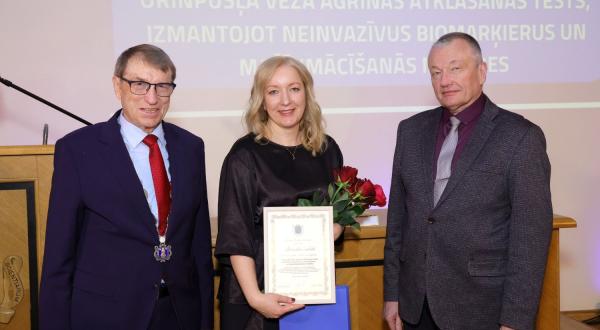Social anthropologist Čarna Brković impressed with RSU Social Anthropology conference
On 18 and 19 October, social anthropologists from Rīga Stradiņš University, together with the assistance from the Baltic-German University Liaison Office, in conjuction with the Max Planck Institute for Social Anthropology and the Latvian Association of Anthropologists organised a conference "Tracing Informality in Southeast and Northeast Europe: Anthropological Perspectives". The keynote speaker was Čarna Brković, a lecturer in Cultural Anthropology and European Ethnology from the University of Goettingen, Germany with a lecture titled "Informality, Clientelism, Patronage, Favors: Anthropological Theories on Getting Things Done" where the topic was "getting things done" in a veering way, examples of this being the pursuit of personal contacts to access healthcare or social benefits.
Čarna Brković presenting her keynote lecture at the RSU conference in the National Library of Latvia.
What is you main area of research and how did you choose this area to focus on?
My doctoral research was on how people help one another through various official and unofficial channels in Bosnia and Herzegovina – I ethnographically researched social protection, healthcare, and vernacular forms of humanitarianism. It turned out that favours and clientelism played a major role in all of these different settings of helping, which is why I started exploring them. In my current research, I explore humanitarianism in Montenegro and how everyday life in a refugee camp takes place.
The Rīga Stradiņš University Social Anthropology programme, together with other institutions, organised the conference you just attended. How did you view research presented by researchers from RSU and the University of Latvia in the context of this topic? Did it shed light on many similarities with the Balkan situation regarding informality?
This was a fantastic conference where I learnt a lot. There seem to be many similarities in how informal practices work in Southeast and Northeast Europe - and probably even in other parts of Europe. Some of the Latvian researchers proposed theoretical concepts which are thought-provoking. In my view, comparative exercises such as this conference are crucial for developing research ideas, plans, and challenging conventional assumptions of area studies. Furthermore, organisers of this conference very gently and effectively normalised academic parenthood, which personally makes me happy and hopeful.
Do you see that post-Soviet and Eastern European ways of "getting things done" could be transposed into Western European settings? Could this be seen as something positive?
I'm not sure if "veze" could be transposed from former Yugoslav countries to any other setting, because they are embedded into particular ways of practicing sociality and personhood. Similarly, various Western European contexts have their own informal ways of getting things done, which would also be difficult to transpose elsewhere. We need to get rid of an assumption that in "proper Europe" there is no informality, favours, or clientelism. Favours and clientelism seem to thrive whenever there is lack of clarity over procedures, roles, and responsibilities – and this happens throughout Europe and outside of it.
Do you see the research training, methods of the Latvian, as well as other Baltic researchers in your area of research compares with that of researchers from other countries in Europe?
Yes, absolutely. Latvian and generally Baltic ethnology and anthropology seems to be very lively. I admire the fact that a research team from Latvia, led by Prof. Sedlenieks, has been running a long-term ethnographic exploration of Montenegro, also within the scope of an EU-funded, Horizon 2020 project INFORM. I come from Montenegro and I am thrilled that there is a growing body of ethnographic research on it – very much thanks to the Latvian research team.
Is this your first time in Latvia? What is your impression of Latvia?
This was my first visit to Latvia – and I hope not a last one! Riga is a beautiful city with an amazing national library. I didn't stay long, but what I saw looked beautiful.
How and when did your collaboration with Latvian researchers begin? What form has it taken? Do you see any future prospective collaborations with Latvian researchers and academics?
Our cooperation was initiated thanks to Dr. Ieva Puzo, one of the organisers of the conference. After that, we started planning an edited volume on anthropology of gender in Montenegro. I hope that our collaboration will intensify in the future in a similar way – through conferences, joint publications, research stays, projects, and so forth.
Did you visit Rīga Stradiņš University while you were here in Latvia? Any impressions you would like to share?
Yes, RSU organised a celebration of the 20 years of the Faculty of Social Sciences, which I briefly attended. I was especially impressed with the old building in Kapseļu iela 23 where the social anthropologists work. It has a history as well as fantastic working conditions.




